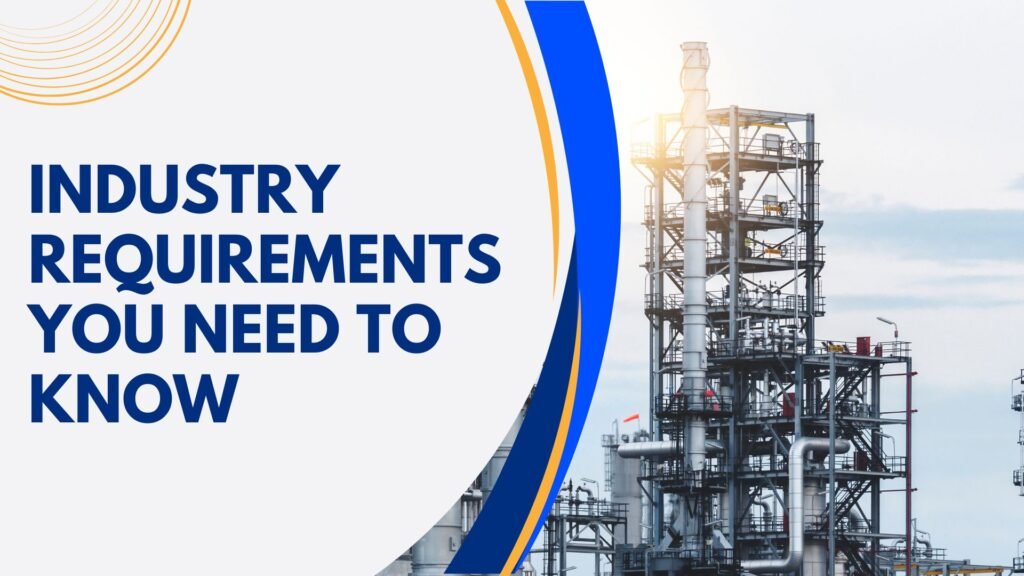In today’s fast-paced global marketplace, staying current with changes in industry requirements is critical for businesses. These updates often shape how organizations operate, comply with regulations, and maintain their competitive edge. Whether you’re part of a regulated industry like healthcare, finance, or manufacturing, or you’re navigating. New policies in sectors such as technology, retail, or education, staying updated on requirement changes is essential.

In this blog, we will dive into the most recent changes in industry requirements. Why these updates matter, and how businesses can stay prepared.
Why Industry Requirement Updates Matter
Regulatory bodies, trade organizations, and government agencies periodically update industry requirements to address new challenges, technological advancements, or market dynamics. These changes often ensure:
- Compliance with laws: Failure to comply with updated regulations can lead to significant legal repercussions. Including fines, penalties, or even the suspension of operations.
- Operational efficiency: Adapting to new standards and guidelines can streamline operations, improve safety, and enhance productivity.
- Sustainability: Many industries are shifting towards environmentally sustainable practices. Staying informed helps businesses meet new sustainability requirements and contribute to long-term ecological goals.
- Consumer protection: Updates ensure that businesses provide products and services that are safer. More reliable, and aligned with consumers’ evolving expectations.
- Competitiveness: Staying on top of industry changes helps organizations remain competitive and aligned with best practices in their field.
Key Industry Requirement Updates Across Sectors
Let’s explore some recent requirement updates in major industries:
1. Healthcare Industry
The healthcare sector continues to face numerous regulatory updates. As governments aim to improve patient care, data protection. And service quality, healthcare providers and suppliers must adapt to the following changes:
- Data Security and Privacy (HIPAA Updates): With the increasing digitalization of healthcare records. Ensuring the privacy and security of patient data has become paramount. The Health Insurance Portability and Accountability Act (HIPAA) has seen revisions to address telemedicine and electronic health records. Providers must ensure that their IT systems and staff are compliant with these changes.
- Telemedicine Guidelines: The rise of telehealth during the COVID-19 pandemic has resulted in new requirements. These include updated rules for licensure, reimbursement, and remote patient monitoring technologies. Healthcare providers offering telemedicine services need to ensure they meet both federal and state-level regulations.
- Medical Device Regulations: Updates from bodies like the FDA have introduced new rules for. Medical device manufacturers regarding safety standards and post-market surveillance. Companies must comply with rigorous reporting standards for adverse events and device performance.
2. Financial Services Industry
Regulation in financial services is continuously evolving to safeguard the integrity of the global financial system, protect consumers, and prevent financial crimes. Recent updates include:
- Anti-Money Laundering (AML) Requirements: Financial institutions must adhere to stricter Know Your Customer (KYC) and AML rules. Enhanced due diligence is now required, particularly for transactions involving high-risk countries or sectors. Digital banking platforms must also strengthen their verification processes to prevent fraud.
- Sustainability and ESG Reporting: There is increasing pressure on financial firms to disclose their environmental, social, and governance (ESG) practices. Regulatory bodies in many countries have introduced mandatory reporting standards for publicly traded companies to ensure transparency around sustainable business practices.
- Cryptocurrency Regulation: As digital assets gain mainstream acceptance, countries are enacting laws to regulate cryptocurrency exchanges, wallets, and trading platforms. Financial institutions dealing in cryptocurrencies must ensure compliance with both taxation rules and anti-fraud measures.
3. Manufacturing Industry
The manufacturing sector has seen significant shifts due to changing global trade agreements, environmental standards, and technological advancements:
- Product Safety and Quality Standards: Manufacturers need to comply with new safety and quality regulations, especially when exporting products to international markets. The recent updates in ISO standards, for example, require higher levels of product testing and traceability in industries such as automotive, electronics, and pharmaceuticals.
- Workplace Safety Regulations: Governments are placing greater emphasis on employee health and safety. This includes stricter Occupational Safety and Health Administration (OSHA) guidelines in the U.S., and updated European Union workplace directives that cover hazardous materials handling, noise levels, and ergonomics.
- Supply Chain Transparency: Manufacturers are required to disclose more information about the sourcing of raw materials, especially in sectors prone to human rights violations or environmental degradation. For instance, the Dodd-Frank Act in the U.S. mandates the reporting of conflict minerals in electronics manufacturing.
4. Technology Industry
Rapid technological advancement often necessitates quick regulatory adaptation. The tech industry, especially companies involved in data collection, AI, and software development, has witnessed critical updates:
- Data Privacy Regulations (GDPR & CCPA): The European Union’s General Data Protection Regulation (GDPR) and the California Consumer Privacy Act (CCPA) have set high standards for data privacy. Tech companies must ensure they have appropriate data protection measures in place, including user consent protocols, data encryption, and breach reporting systems.
- Artificial Intelligence (AI) Regulation: As AI becomes more integrated into business processes, new requirements are being introduced to ensure ethical AI usage. Some regions have proposed AI regulatory frameworks that call for transparency in AI decision-making and prevent discriminatory or biased AI models.Recent Changes in Industry Requirements
- Cybersecurity Compliance: With the rise in cyber-attacks, industries like cloud services, software development, and e-commerce need to comply with updated cybersecurity standards, such as the Cybersecurity Maturity Model Certification (CMMC) in the U.S.
5. Retail and E-commerce
The retail and e-commerce sectors have experienced shifts in consumer protection laws, data privacy regulations, and environmental standards:
- Consumer Rights and Protection: New consumer protection laws are focusing on transparency in pricing, return policies, and the accuracy of product descriptions. Retailers, both online and offline, need to ensure their sales practices are compliant.
- Sustainability Requirements: There is increasing emphasis on sustainable sourcing, especially in fashion and electronics. Retailers are expected to disclose the environmental impact of their products, including carbon footprints, supply chain transparency, and recyclable packaging.
- Payment Security Standards: With the rise of online shopping, businesses need to comply with updated Payment Card Industry Data Security Standards (PCI DSS) to ensure secure transactions and prevent data breaches.
How Businesses Can Stay Compliant
To effectively manage industry requirement updates, businesses should:
- Implement Regular Audits: Conducting regular compliance audits helps identify areas of improvement and ensures adherence to new regulations.
- Employee Training: It’s essential to keep employees informed about updated practices through regular training programs, especially in sectors like healthcare and finance where the cost of non-compliance is high.
- Partner with Compliance Experts: Working with legal advisors and industry experts can provide guidance on how to adapt to new regulations efficiently.
- Utilize Technology Solutions: Compliance management software can help automate tasks, track changes in regulations, and ensure that your business stays up to date.Recent Changes in Industry Requirements
Conclusion
Staying informed about recent changes in industry requirements is not just about compliance but also about maintaining your company’s reputation, ensuring operational efficiency, and remaining competitive. Whether it’s healthcare, finance, technology, or manufacturing, understanding these updates and preparing accordingly will position your business for success in a rapidly evolving world.




